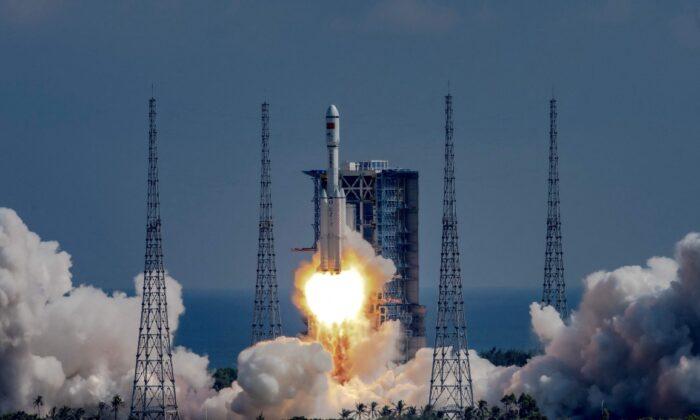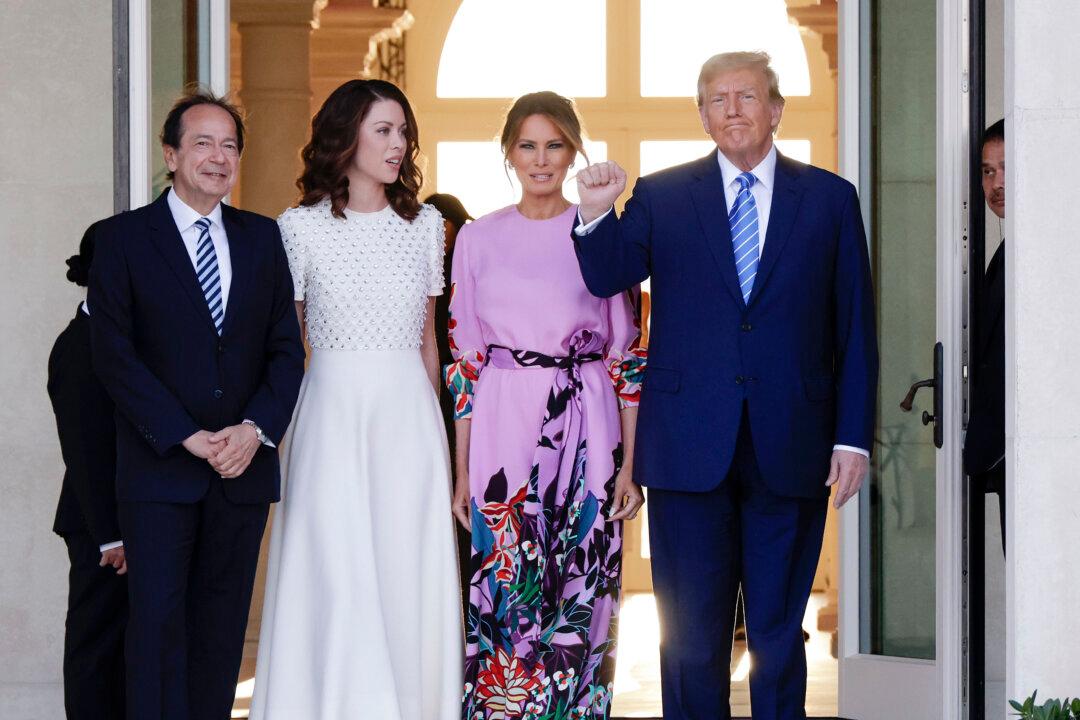A leading American rocket scientist says the United States and its like-minded allies still have an opportunity to cripple China’s rapid weaponization of space, which is reliant on ongoing foreign investment, to prevent a potential war breaking out in space.
However, that window of opportunity is closing.
After investing billions of dollars and years of effort, the CCP now has four to five times as many rockets, rocket launch sites, and space personnel as the United States, according to Mr. Bruno.
They have been able to achieve this primarily through technology mostly stolen from the United States, but also due to the vast volume of Western investment dollars that have flowed into China since the 2000s.
“While our fundamental technology remains superior to China—and I say that with great confidence and knowledge of the subject—they have invested heavily in applying those basic technologies to space weapons and anti-satellite capabilities, and they are deploying those right now at a shockingly rapid pace,” Mr. Bruno told the hearing.
“But we have opportunities to counter this. While vast, their infrastructure is inefficient, it is expensive, and it is brittle with respect to prolonged economic stress. And a curtailment or cessation of Western investment—which by the way is almost half a trillion dollars a year into China’s economy—could cripple that capability that they have now.”
He added that Western investment has seen China’s space program go from a few dozen spacecraft in orbit to nearly 700 in orbit in just a span of a few years.
“Their birds are everywhere, from LEO (low Earth orbit) a scant 500 kilometers above your head all the way out to GEO (geostationary orbit) at 30,000 km and beyond,” the former Lockheed Martin engineer said.
“I think it’s important that we also recognize that space simultaneously has become much more important to U.S. national security, while also becoming so much more vulnerable to our adversaries—especially China. It’s no longer a force multiplier for us like it once was; space is now required for basic military effectiveness. Without it, it’s not that our forces are better, it’s that they are essentially impotent.
CCP’s Space Threat
Committee ranking member Rep. Raja Krishnamoorthi (R-Ill.) noted that the CCP has made some concerning statements about their intentions in space.“They said it’s the ultimate high ground. And similar to wanting to control territory in the South China Sea, they’ve talked about conquering portions of space,” he said, referring to the five strategic Lagrange points around the Earth, Moon, and Sun, where space assets can remain parked without expending fuel due to neutral gravitational forces.
Mr. Krishnamoorthi said the CCP’s actions show they’re engaged in another space race.
“Unfortunately, we understand that the CCP is trying to control those particular parking spots for navigation, positioning, and surveillance in space,” he said.
NASA’s former administrator Jim Bridenstine, who was answering questions from members of Congress at the hearing, described the Lagrange points in space as being “like choke points on the ocean.”
“So, think about the straight of Hormuz, access to the Persian Gulf, the straight of Malacca to get to the Indian Ocean; these are all very important choke points on Earth if you want to keep channels of communication open,” he said. “And they have to be protected. Left alone, the worst people will control those areas and that’s going to be true in the Lagrange Points as well.”
While the United States currently remains the leader in space, the CCP is working quickly to undermine this strategic advantage with various threats.
Mr. Bridenstine noted that while the United States has never weaponized space in terms of targeting things from space, China, and Russia have designed capabilities that do just that.
“We’ve not weaponized space in the sense that we’re going to destroy things in space; we’ve not done that. What we’ve done is we’ve used space as an enabler for the terrestrial fight that’s been our power projection overmatch, it has aided us in every war that I was ever involved in.
“China and Russia are going to counter that and they have,” he said. “And that’s why we have to worry about these new technologies that are operating: direct descent anti-satellite weapons, co-orbital anti-satellite satellites with spoofing/jamming/dazzling/hacking. All these things are now proliferating.”
A third expert at the hearing, Ret. Gen. John Raymond, said the United States and its allies are facing a full spectrum of threats today, “everything from reversible jamming of GPS and communications satellites to directed energy threats—think lasers that can blind or dazzle satellites—to satellites that are in orbit that have characteristics that could be a weapon as well.”
He listed a couple of examples. “China has a satellite that has a robotic arm that can reach out and grab another satellite. And space geeks will tell you that satellites don’t like to be grabbed and that'd be a bad day for that satellite,” he said.
“Russia has a satellite that they launched first in 2017 then in 2019. I deemed it the nesting doll satellite. They have a satellite that launches, the doll opens up if you will and another satellite comes out and then it opens up and a projectile comes out designed to kill a U.S. satellite. There’s the direct ascent anti-satellite threat, so missiles that can launch from the ground, that 15-minute trip to space if there’s a satellite in low Earth orbit. Both China and Russia have missiles that can launch from the ground and blow up a satellite in a handful of minutes.”
He also listed cyber threats facing satellites as well as talk of Russia potentially launching a nuclear weapon in space.
Freedom Versus Authoritarianism
Mr. Bruno also warned that contrary to the “environment that values democracy and cherishes human dignity” that has been characteristic of American space leadership over the decades since Apollo 11 landed on the moon, “China intends to export its authoritarian form of government and its faceless bureaucracy as a global power.”“They can’t contend with our terrestrial forces, that’s why they have invested to be able to take space away from us,” he said. “They’ve recognized that space is our Achilles’ heel and they’re using that asymmetric opportunity to be able to dominate terrestrially through military intimidation and economic power.
“You cannot separate our prosperity and our safety and our freedom any longer from space. If we’re going to preserve freedom, we have to preserve the freedom of space.”
Ret. Gen. Raymond, formerly of the U.S. Space Force, agreed and said that for true global stability and innovation, American leadership in space is crucial over Chinese communist leadership.
“Intensifying strategic competition with China presents a serious threat to the U.S. national security and that competition expands into the space domain. I believe that competition over the next 10 years might be the most critical 10 years in the history of our space program. And we cannot afford to lose.”
Mr. Bridenstine said China’s space weapon capability presents a reality that in a possible invasion of Taiwan, the CCP could attack U.S. GPS capabilities in space, which would “make us deaf, dumb, and blind” on the ground.
“That goes from a regional tactical scenario to a strategic scenario just like that, and it’s a very dangerous development,” he explained.
“They actually now have a permanent space station called Tiangong and it was stationed in Space in 2021; I mean this is really an incredible technological feat for them to put that up there. Now, they have 900 satellites in orbit, half of which have the ability to detect and track U.S. aircraft carriers as well as naval movements.
‘Sacred Duty’
Mr. Bridenstine and Ret. Gen. Raymond also urged the committee and Congress to adopt the development of a responsible counter-space framework as national policy.Ret. Gen. Raymond warned that the proliferation of satellites in low Earth orbit has outpaced existing frameworks and treaties that have to date provided guardrails in space.
“The outer space treaty provides a great foundation. I’m not saying do away with that, but we need to build on top of that some norms of behavior on how to operate in this domain, and in a manner that is safe and professional. And we need to be the ones that shape that, not letting our adversaries shape that or put those rules in place and shape us.
“We’re working that very hard with our allies and partners. The United States has stepped up and has been a leader in that. We’ve said we will not conduct a destructive test and cause debris. We’ve talked about [how] we’re going to limit debris.”
Mr. Bridenstine also urged Congress to ensure consistent funding and “continuity of purpose” for NASA.
The panelists all agreed that NASA and private space companies have been facing inconsistent investment and a lack of policy support to help ensure that U.S. space dominance continues to go from strength to strength in the future.
“It’s important to note, we need NASA authorization every year. We need a consistent kind of framework by which to operate,” the former head of NASA said.
“This year [NASA’s budget is] being cut, which now throws everything into a frenzy. Hard decisions are having to be made right now. And by cutting the money, you actually waste the money because, at the end of the day, we don’t achieve the accomplishments that we set out to achieve.”
“This budget reduction increases the risk to both our space capabilities, our Joint Forces, and our ability to compete, deter, and win. Timely budgets that prioritize both resilience and space security are critical to our national security. With every challenge comes opportunities, and I do believe with Congressional support, we can capitalize on the many opportunities that are associated with space.”
He added that U.S. leaders have a “sacred duty” to protect U.S. armed forces on the ground who are being watched by the CCP from space.
“They’re being tracked, they can be targeted, and they can be killed with that space-enabled military from China,” the general said.
Mr. Bridenstine didn’t hold back his criticism of members of Congress for the lack of stability in funding U.S. space endeavors.
“I think there’s a number of things over time that have conspired to slow our progress to the Moon and obviously then to Mars. I think to start, we have had programs started and stopped with the whimsical budgets of politicians, and I’m not saying that to be critical of this body but I am certainly being critical of this body,” he said.
He said that due to inconsistent support from Congress, the United States was, for some time, paying Russia $100 million per seat to use their rockets to reach the International Space Station.
He suggested that Congress should ensure stability going forward by green-lighting congressional authorizations as well as appropriations for NASA to ensure annual continuity in funding. The authorizations would provide long-term directional goals but can also be updated every year.
He also advocated for Congress to create the right conditions for private enterprise to compete for space contracts, allowing America’s entrepreneurs to “commercialize as much of these capabilities as possible” in order to free themselves from the fluctuations of NASA’s budget.
“We can’t out-centrally-plan China but what we can do is we can out-entrepreneur China, and that’s where the innovation takes place,” he said.
Mr. Bruno also urged Congress to end China’s access to the U.S. technologies needed by their acquired capabilities.
“While they have developed space weapons of novel types, they remain very, very dependent on acquiring technology from the United States on an ongoing basis, so this must be curtailed as well,” he said.






